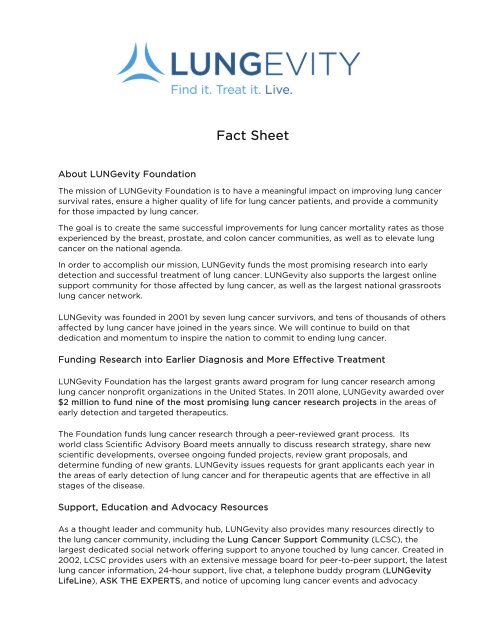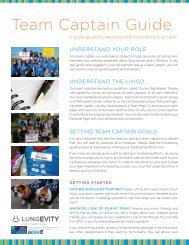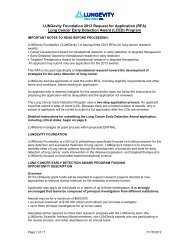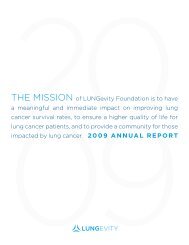Fact Sheet - LUNGevity Foundation
Fact Sheet - LUNGevity Foundation
Fact Sheet - LUNGevity Foundation
You also want an ePaper? Increase the reach of your titles
YUMPU automatically turns print PDFs into web optimized ePapers that Google loves.
<strong>Fact</strong> <strong>Sheet</strong><br />
About <strong>LUNGevity</strong> <strong>Foundation</strong><br />
The mission of <strong>LUNGevity</strong> <strong>Foundation</strong> is to have a meaningful impact on improving lung cancer<br />
survival rates, ensure a higher quality of life for lung cancer patients, and provide a community<br />
for those impacted by lung cancer.<br />
The goal is to create the same successful improvements for lung cancer mortality rates as those<br />
experienced by the breast, prostate, and colon cancer communities, as well as to elevate lung<br />
cancer on the national agenda.<br />
In order to accomplish our mission, <strong>LUNGevity</strong> funds the most promising research into early<br />
detection and successful treatment of lung cancer. <strong>LUNGevity</strong> also supports the largest online<br />
support community for those affected by lung cancer, as well as the largest national grassroots<br />
lung cancer network.<br />
<strong>LUNGevity</strong> was founded in 2001 by seven lung cancer survivors, and tens of thousands of others<br />
affected by lung cancer have joined in the years since. We will continue to build on that<br />
dedication and momentum to inspire the nation to commit to ending lung cancer.<br />
Funding Research into Earlier Diagnosis and More Effective Treatment<br />
<strong>LUNGevity</strong> <strong>Foundation</strong> has the largest grants award program for lung cancer research among<br />
lung cancer nonprofit organizations in the United States. In 2011 alone, <strong>LUNGevity</strong> awarded over<br />
$2 million to fund nine of the most promising lung cancer research projects in the areas of<br />
early detection and targeted therapeutics.<br />
The <strong>Foundation</strong> funds lung cancer research through a peer-reviewed grant process. Its<br />
world class Scientific Advisory Board meets annually to discuss research strategy, share new<br />
scientific developments, oversee ongoing funded projects, review grant proposals, and<br />
determine funding of new grants. <strong>LUNGevity</strong> issues requests for grant applicants each year in<br />
the areas of early detection of lung cancer and for therapeutic agents that are effective in all<br />
stages of the disease.<br />
Support, Education and Advocacy Resources<br />
As a thought leader and community hub, <strong>LUNGevity</strong> also provides many resources directly to<br />
the lung cancer community, including the Lung Cancer Support Community (LCSC), the<br />
largest dedicated social network offering support to anyone touched by lung cancer. Created in<br />
2002, LCSC provides users with an extensive message board for peer-to-peer support, the latest<br />
lung cancer information, 24-hour support, live chat, a telephone buddy program (<strong>LUNGevity</strong><br />
LifeLine), ASK THE EXPERTS, and notice of upcoming lung cancer events and advocacy
opportunities. For those interested in taking action to raise awareness about lung cancer and<br />
<strong>LUNGevity</strong>, we offer <strong>LUNGevity</strong> Link UP!<br />
As part of the online resources it offers, the <strong>Foundation</strong> also recently unveiled the Caregiver<br />
Resource Center, which offers emotional support, practical and patient advocacy advice, and<br />
other services for caregivers. It is the first online resource wholly devoted to lung cancer<br />
caregivers.<br />
Events Across the Country<br />
<strong>LUNGevity</strong> has the largest national network of grassroots events aimed at raising money for<br />
life saving lung cancer research and creating awareness about the disease. Dedicated and<br />
passionate volunteers from across the country plan local fundraising events to help <strong>LUNGevity</strong><br />
fund its research program into earlier detection and more effective treatment of lung cancer,<br />
bringing together tens of thousands of lung cancer patients, survivors, families, friends, and<br />
advocates in 19 states and counting to change the course of lung cancer.<br />
<strong>Fact</strong>s About Lung Cancer<br />
• 1 in 14 people in the U.S. will be diagnosed with lung cancer in their lifetime 1<br />
• 226,000 people will be diagnosed with lung cancer in 2012 1<br />
• Approximately 55% of all new lung cancer diagnoses are among people who have<br />
never smoked or have already quit smoking 2,3<br />
• Because there is no widely-available, effective early diagnostic test for lung<br />
cancer, only 15% of people will be diagnosed in the earliest stage, when the<br />
disease is most treatable 1<br />
• Only 16% of all people diagnosed with lung cancer will survive 5 years or more 4<br />
• Lung cancer kills more people than the next four cancers (breast, prostate,<br />
colorectal and pancreatic) combined 1<br />
• Lung cancer kills almost twice as many women as breast cancer, and more than three<br />
times as many men as prostate cancer 1<br />
• There is hope: The 1-year survival rate for lung cancer increased from 37% in<br />
1975-1979 to 43% in 2003-2006, mostly thanks to improvements in treatment 1<br />
• If lung cancer is caught before it spreads, the chance for 5-year survival improves<br />
to 52% 4<br />
Sources: 1 Cancer <strong>Fact</strong>s & Figures 2012. Atlanta: American Cancer Society; 2012. 2 Thun, MJ, et<br />
al. Lung Cancer Occurrence in Never-Smokers: An Analysis of 13 Cohorts and 22 Cancer<br />
Registry Studies. PLOS Medicine, 2008. 5(9): e185. Doi:10.1371/journal.pmed.0050185; 3 Tong, L,<br />
et al. Lung carcinoma in former smokers. Cancer,1996. 78(5): 1004-1010. 4 Howlader N, Krapcho<br />
M, Neyman N, et al. (eds). SEER Cancer Statistics Review, 1975-2008, National Cancer Institute,<br />
Bethesda, MD, www.seer.cancer.gov/csr/1975_2008/, 2011








